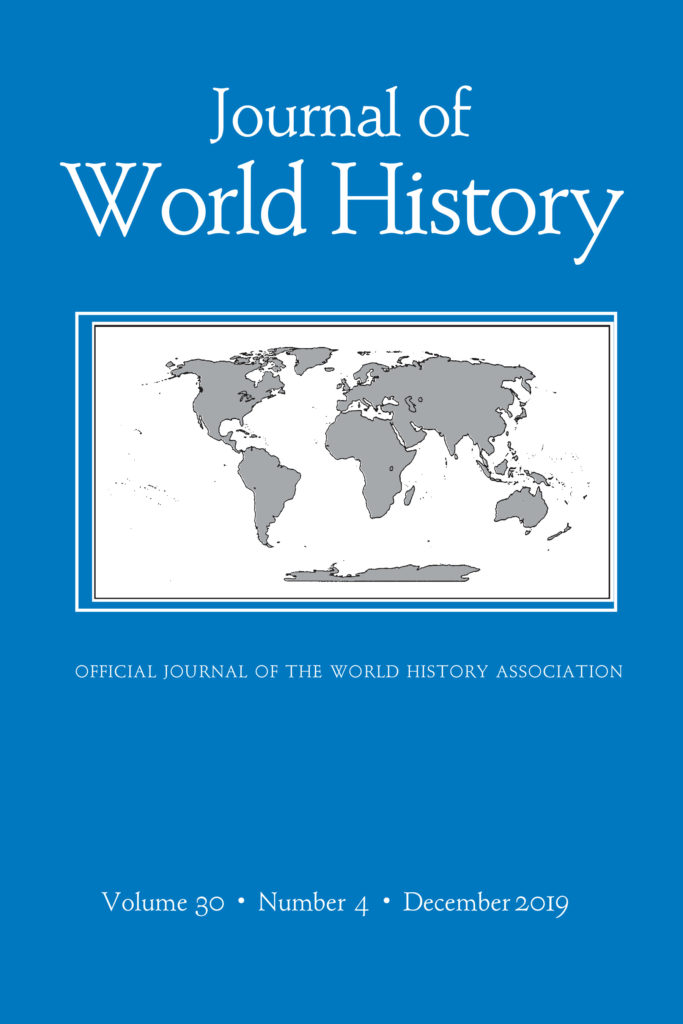This issue of the Journal of World History includes the following scholarly articles:
Economic Conquest of the Pacific: Revisiting the Tacna-Arica Plebiscite of 1925–1926
By Robert Niebuhr
This article surveys the Tacna-Arica plebiscite period (1925–1926) by taking into consideration the regional history alongside increasingly important global trends. While the contest between Peru and Chile highlights the battle between primordial versus constructed nationalism, it also places contested notions of nationalism alongside a growing spirit of internationalism. Woodrow Wilson’s proclamations at the end of World War I, especially his focus on self-determination and justice, directly inspired leaders in Bolivia, Chile, and Peru to seek a finalization of the Tacna-Arica dispute. Despite the hope that Wilsonian principals would win the day, traditional concepts such as economics and power proved victorious, which underscored the fragility of humanitarian rights and justice between the world wars. This investigation into how global trends influenced Tacna-Arica are placed alongside contemporary comparisons of plebiscites held in Europe between the world wars.
Igniting Change in Colonial Indonesia: Soemarsono’s Contestation of Colonial Hegemony in a Global Context
By Arnout H. C. Van Der Meer
In 1913, Javanese public prosecutor Soemarsono clashed with his colonial superior by refusing him traditional deference, donning European clothes, and actively engaging in nationalist associations. These actions culminated in an overhaul of the appearance of Dutch hegemony and a widespread emancipatory social change in colonial Indonesia. This history is best appreciated from a world historical perspective that includes both long-term historical processes that shaped Soemarsono’s world, such as the Indianization of Indonesia, the spread of Islam, and Western colonialism, as well as contemporary global developments, such as the rise of Japan, the Chinese revolution, Islamic Modernism, and the appeal of democratic principles. Soemarsono’s awareness of these global perspectives enabled him to successfully ignite change in colonial Indonesia. His story provides an approach that allows historians to emphasize how individual agents make history in a world historical context.
This article assesses how Ismaili Muslim leaders in British colonial Tanganyika utilized Guiding and Victorian schooling philosophies in an attempt to negotiate for advancement within the colonial structure. Aga Khan III understood the role that followers were expected to play in the “Great Game” of imperialism and attempted to use cooperation to broker for increased opportunities within the system of subjugation. This article sets out to analyze then how the Aga Khan and his representative leaders in British colonial Tanganyika used youth programs to operate within these liminal spaces, in turn revealing the ongoing negotiations that took place between colonizer and the colonized.
In early 1910, Chinese revolutionaries attempted to assassinate the regent of the Qing Empire by planting a bomb near his residence in Beijing. Two years later, an explosive of a similar type was used by Indian revolutionaries in their attempted assassination of the viceroy of the British Raj in Delhi. Investigating these two seemingly unconnected events demonstrates that radical political activists in both China and India acquired their explosive-making skills from diasporic Russian revolutionaries in Japan and France respectively after the failure of the 1905 Russian Revolution. Although both assassination attempts failed and have largely been marginalized in the national narratives in both countries, the transnational connections between Chinese and Indian revolutionaries in their pursuit of learning the portable dynamite technology overseas sheds light on how modern Chinese and Indian history can be analyzed in a single framework. Staging Chinese and Indian revolutionary terrorism in the context of the cross-boundary circulation of dissident ideologies and technologies in the early twentieth century reexamines marginalized aspects of China’s 1911 Revolution and the Indian Nationalist Revolution that can be written as connected transnational history.
Putting Words in the Emperor’s Mouth: A Genealogy of Colonial Potential in the Study of Qing Chinese Diaspora
By Nicholas McGee
The Qing emperor Qianlong’s supposed response to the 1740 massacre of roughly 8,000 Chinese civilians in Dutch Batavia represents perhaps the most famous quotation by any Chinese emperor concerning the diaspora. Tracing a genealogy of the quote, this article contends that it was in fact invented and deployed by eighteenth and nineteenth century British authors in service of a discourse that framed Chinese migrants as ideal potential colonial recruits and the Qing state as secretly desiring their recruitment. Only in the twentieth century was it taken up by Chinese authors, who mourned the Qing’s failure to capitalize on this colonial potential in their efforts to construct a diaspora-centered national identity. Legacies of this translingual discourse endure, especially in the narrative that the Qing state forbade its subjects from going overseas, and disowned those who did so, until forced to allow Chinese indentured labor recruitment following the Second Opium War (1856–1860).
Plus book reviews.





